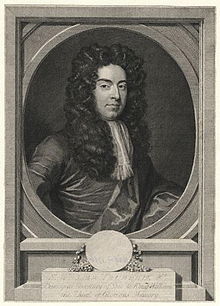Sir William Trumball
Sir William Trumbull (8 September 1639 – 14 December 1716) was an English statesman who held high office as a member of the First Whig Junto.
Trumbull was born at Easthampstead Park in Berkshire and baptised on 11 September 1639. He was the son and heir of William Trumbull (1594–1668) and grandson of William Trumbull, the Jacobean period diplomat. His mother was Elizabeth Weckerlin (c. 1619-11 July 1652), only daughter of George Rodolph Weckerlin. He received his early instruction in Latin and French from his maternal grandfather, and was sent in 1649 to Wokingham School. He matriculated from St John's College, Oxford on 5 April 1655, being entered as a gentleman-commoner under the Rev. Thomas Wyatt, and in 1657 was elected to a fellowship at All Souls' College, Oxford, which he probably retained until his marriage in 1670. In the same year he was entered at the Middle Temple. He graduated Bachelor of Civil Law on 12 October 1659. After completing his degree, he visited France and Italy, where he met several distinguished persons, such as Lords Sunderland and Godolphin, Algernon Sidney and Henry Compton. In 1664 and 1665 he travelled in company with Sir Christopher Wren and Edward Browne. In 1666, Trumbull returned to college and in 1667 he was awarded a Doctorate of Civil Law.
He was admitted an advocate in Doctors' Commons in London on 28 April 1668 and began practising in the ecclesiastical and admiralty courts. He would remain for the next 15 years, becoming a lawyer of high repute. Through the offices of his father-in-law, Sir Charles Cotterell, he was appointed chancellor of the diocese of Rochester in 1671 by its bishop, John Dolben, the future archbishop of York, and benefited much from ‘the friendship and patronage of that great and good man’.
...
Wikipedia

